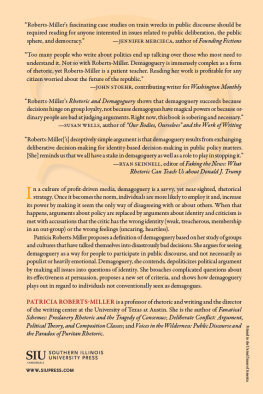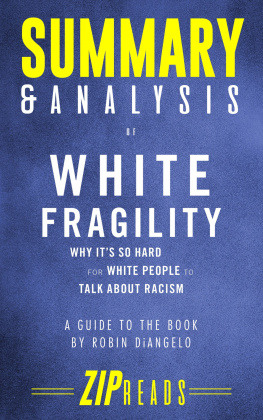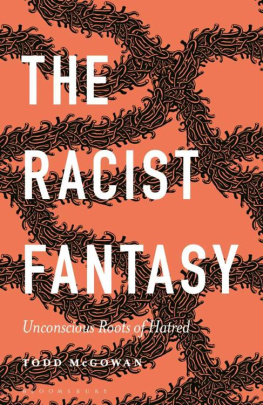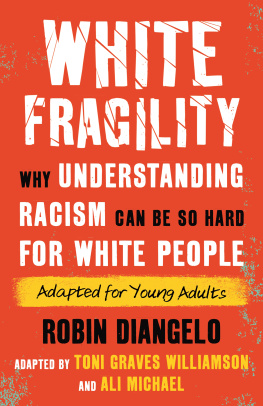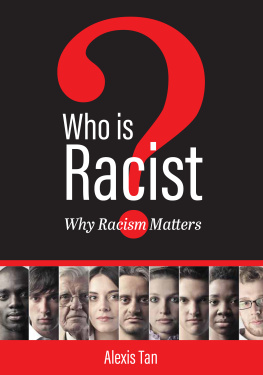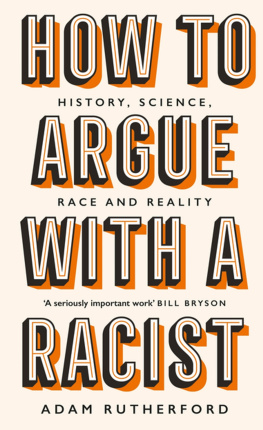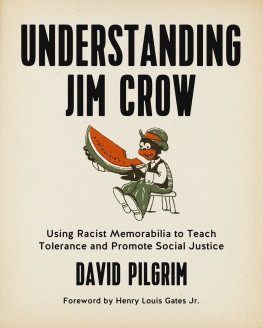1
Why Do Disagreements About Racism Go So Badly?
O n a scholarly mailing listof communication scholars, no lesssomeone (call him Chester) posted a comment that some other people on the list thought was racist, and they said so. Chester pointed out his legitimate and impressive credentials of anti-racist work and, before long, was threatening to sue for defamation of character anyone who called him racist because, he said, calling someone a racist is such a terrible accusation. The argument got so ugly and unproductive that the mailing list shut down discussion altogether, about every topic.
This was the second time in a relatively short period that this list of communication scholars had been unable to have a productive disagreement about racism. The other controversy began with a disagreement as to whether the fact that a prestigious group was almost exclusively white was a sign that the selection processes were racist. In both cases, to say that the disagreement escalated quickly into accusations of bad faith and bad character is an understatement. It shot there like a rocket.
I knew about the controversies because Im a professor of rhetoricI have three degrees in rhetoricand my area of expertise happens to be when rhetoric has disastrous consequences, when people talk themselves into bad decisions. And, in those decisions, racism is not infrequently a factor. In New York, Irish racism about the Italians meant that they wouldnt work together on mutually beneficial policies, or even have religious services together. To give a more drastic example, Hitler didnt take seriously that the United States might enter the war against Germany because he believed the US being a mongrel country (what we would call multiethnic and multicultural) meant its troops couldnt possibly be any good. That was a mistake he made because he was racist.
Not everyone who is racist is as racist as Hitler was (much of this book will be about the mistake of thinking of racism as an all-or-nothing situation), but some people are close enough, believing in and repeating evil, hateful, intentionally malicious racism. Theyre not basing their beliefs on reason, and their intentions arent open to persuasion. This book isnt about trying to have constructive conversations with those peoplelet alone persuade them.
Those people cant be persuaded, but they can be refuted, and thats worth doing under some circumstances. Adam Rutherfords
How to Argue With a Racist is a useful resource for that endeavor. Its also sometimes a good choice not to engage them at all and just vote against them.
Thinking about racism as all-or-nothing (youre Hitler or you dont have a racist bone in your body) contributes to racism because it enables us to refuse to think about whether weve done something racist on the grounds that we arent as bad as Hitler. Thinking that being racist means youre Hitler means that we cant have useful disagreements about the various kinds of racism that dont immediately rise to genocide.
Still and all, why should a scholar and teacher of rhetoric be able to give useful advice about disagreements regarding racism? A lot of people think of rhetoric as the art of tricking people with words, what Protagoras, a fifth-century Athenian scholar of rhetoric, called the ability to make the worse argument seem as though it is the better. But rhetoric has also been called the art of understanding misunderstandings. This book is in that latter spiritits about understanding why people disagree so badly about racism, even scholars of communication, and how to learn from those disagreements and misunderstandings.
Certainly, disagreement is generally hard, and disagreements about racism do share some missteps with bad disagreements of all sorts. But the mailing list disagreements didnt just escalatethey escalated up exactly the same steps that bad disagreements about racism almost always do, whether the setting is social media, Thanksgiving dinner, a party, a meeting, and so on. The mailing list disagreements didnt go wrong just because digital disagreements are especially treacherous, nor was it that the people disagreeing didnt know how to disagree productively. This disagreement was among experts in rhetoric and communicationpeople who study disagreement for a livingyet it didnt go any better than nonexperts shouting at each other over pumpkin pie. The problem isnt how people disagree; its about how people disagree when it comes to racism.
This book explains why disagreements about racism so often escalate in the same way. Its largely because so many people misunderstand what racism is and how it works; that is, what a disagreement about racism is really about, and what our options are when we disagree.
Imagine two people who disagree about whether the novel To Kill a Mockingbird is racist, Hubert and Emma. The conversation might be something like this:
Hubert: How can you like something as racist as To Kill a Mockingbird when the author was such a racist?
Emma: How can you say that To Kill a Mockingbird is racist when the book explicitly condemns racism?
Notice that both Hubert and Emma are taking the argument in a direction that cant really be answeredhow can you do something? That is, theyre making the issue about how it is that the other person can believe something so ridiculous. Thats the first misstep in disagreeing about racismmaking it about how stupid/misguided/ignorant the other person is for having the position they do.
Theres something else interesting about how theyre arguing, and its especially clear if you look at it in terms of what Aristotle pointed out about how people argue on most issues. He pointed out that people tend to argue using what are called enthymemes, basically compressed syllogisms. Instead of saying, All men are mortal [major premise], and Socrates is a man [minor premise], and therefore Socrates is mortal [conclusion], we say, Of course Socrates will die [conclusion]hes a man [minor premise]. The major premise (all men are mortal) is implied. If you look at the disagreement between Emma and Hubert that way, you can see that although they have very different conclusions, they both have minor premises that are factually true. Harper Lee was racist, and the book does condemn certain people as racist.
People often think that we disagree because we have different facts, or we disagree about the facts, or the other side doesnt have facts. On the contrary, as in the case of this argument, often, we agree about the facts. The disagreement is at the level of major premise. Its as though two people keep shouting at each other about whether Socrates is a man when they really disagree about whether all men are mortal. Hubert assumes that anything created by a racist is racist, and Emma doesnt. Emma assumes that a text cant condemn racism and be racist at the same time, and Hubert may or may not agree. They disagree about what the most useful criteria are for deciding that something is racist.
This book will start by talking about what are some ineffective ways to define racism before offering general advice about such disagreements. This book wont enable you to go through the world stamping things racist or not racist ; it wont guarantee that you triumph over everyone who disagrees with you about whether something is racist, or ensure that you reach agreement any time the question of racism comes up. I cant give scripts that will always successfully persuade someone that theyre racist or that you arent, because there are too many ways a disagreement about racism might go. You may still find yourself in a lot of disagreements that end in neither person changing their mind, at least in the moment, but that might be a useful disagreement. You might also decide that youre interacting with someone incapable of rational argumentation, and this book will help you choose when to walk away. It will, I hope, help us often disagree
Next page

